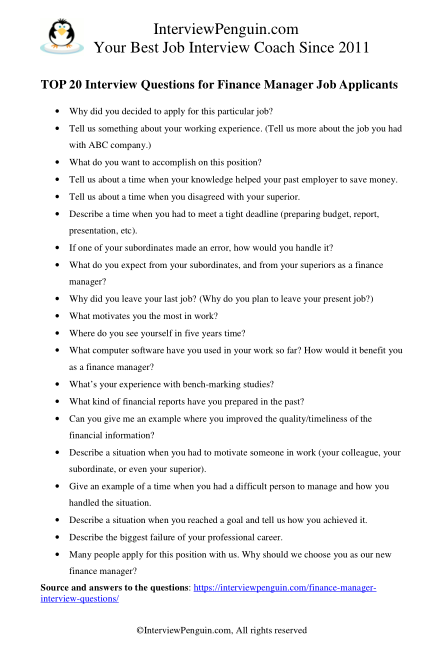Table of Contents
Why have you decided to apply for this particular job?
Try to talk about the value you can (and want to) bring to their organization as a Finance Manager. You can explain how your education and previous experience prepared you for the role, how all jobs you had, and skills you gained while doing them, helped you to understand the life of an organization in terms of cash flow and profit and loss.
You can also refer to their company, the products/services they offer to final customers, their excellent reputation, values and goals, a great perspective for the future, or simply to anything that motivated you to apply with them, and not with some of their competitors, or with a completely different organization.
Tell us something about your working experience. (Tell us more about the job you had with ABC company.)
The more you can relate to their industry and type of business, the better your chances to succeed in this interview. Now it doesn’t mean that if you worked as a Financial Analyst in a big retail store you do not have a chance to get a job of a Finance Manager at school.
Because, at the end of the day, you work with budgets and forecasts and reports, and of course with people, in both places. The key is to explain the connection of the two, because hiring managers may struggle to see it. Of course, experience from the same type of organization is always a plus.
Try to keep it brief though. Name a position, a few key duties you had (ideally relevant for your new job), and one or two things you achieved in your work (for the organization, not employee of a month award or some similar badge you earned).
What do you want to accomplish working as a Finance Manager?
Try to talk about things you want to accomplish for your employer, and not only for you. Typically you will have access to balance sheets and cash flow statements of the company, for at least the last five years (in most modern world countries companies are obliged to share the documents publicly, and you will find it on a website of a governmental institution responsible for tax collection).
Study them in detail, and point out some areas for improvement, and particularly what you want to accomplish in these areas. Obviously not everything is clear from the financial documents, and you may need to ask them some follow-up questions in an interview. But the bare fact that you studied the cash flow and balance sheet will make impression on the interviewers.
* May also interest you: Why do you want to work in finance? 7 sample answers.
Tell us about a time when your knowledge helped your past employer to save money.
You have plethora of options in this case. You can talk about a managerial decision, when you understood that some employees (accountants, financial analysts) working under you were doing a bad job. Replacing/relocating/training/firing these people, you helped your employer to save money.
Another good answer would refer to your accounting skills. Choosing the right method of depreciation, or planning expenses properly in various fiscal terms, according to profits of the company and their business plan, can also lead to significant cost reduction (in terms of taxes paid).
You can also tell about a case when you reviewed a budget for a particular project/department, spotted expenses that weren’t necessary, reduced them and again saved money for your employer.
Where do you see yourself in five years time?
Try to connect your future with their company. If you apply for a finance manager job in a school, smaller non-profit, or other similar organization, the best you can do here is saying that you’d like to work as a Finance Manager in five years time—ideally in their business.
Finance Manager is sometimes the highest, or even the only role they have in their Finance & Accounting department, hence it makes no sense to talk about promotion here. Not getting promoted doesn’t equal to stagnation, however.
You can say that you hope to become better in everything you do—reporting, analyzing, forecasting, managing, communicating, and grow as human being and professional manager, while helping their organization to progress and achieve their goals.
Situation changes when you apply for a job with a bigger corporation. Then you can aim for a position of a Financial Controller or even Finance Director in five years time. Do not be afraid to be ambitious. You won’t progress to these roles unless you do a tremendous job as their Finance Manager, and that’s exactly what they hope for. Hence it makes a perfect sense aiming for future promotion…
* Special Tip: To know how to answer a question, and to come up with a great answer on a big day, when facing a panel of interviewers, are two different things. Have a look at a new eBook I published, the Finance Manager Interview Guide. Multiple premium answers to 25 most common finance manager interview questions will help you stand out and outclass the other job candidates in this competitive interview. Thank you for checking it out!
Describe a time when you had to meet a tight deadline (preparing budget, report, presentation, etc).
Once again, your attitude matters more than the situation you narrate. Show the interviewers that you do not panic under pressure, that you know how to prioritize your work, do not mind staying overtime if necessary, and always do your best to meet the deadlines.
You can even talk about a situation when you failed to meet a deadline (if that’s the one that stayed in your conscious memory). The key is to show them that you tried your very best, and did not panic. If you want, you can check out 7 sample answers to a similar question: Tell me about a time when you missed a deadline.
If one of your subordinates made an error, how would you handle it?
Errors belong to the work of an accountant and financial analyst. Even the best accountants I had a honor to work with in my life made some mistakes (and they typically realized their mistakes a few hours or a few days later).
Show the interviewers that you have the right attitude to your colleagues. You can say that you would explain them the error, why it occurred, show them how to avoid it for the next time, and give them a short test exercise to ensure that they understood the issue clearly, and won’t repeat the same error.
What do you expect from your subordinates, and from your superiors as a finance manager?
You have several options for a good answer to this question. First one is saying that you have high expectations on one person only—on yourself. The hiring managers have for sure done their job well, getting the right people onboard. It is not your duty to judge the qualification or motivation of your colleagues.
You will focus on your job and duties, giving your 100% at work each day, and trying to be attentive to the needs and feelings of your colleagues, in order to maintain good relationships in the workplace. This applies especially to your superiors.
Speaking about your subordinates, you will try to guide them in work, and you expect them to take care of their duties, and to try hard—following your example.
Another option is referring to communication. You can say that you hope to get constructive feedback from both your superiors and subordinates. And they should be receptive to such feedback from your end.
As long as people communicate openly together across the organization, regardless of their position within the corporate hierarchy, and everyone tries their best, the financial department and the entire organization will thrive…
Other questions they may ask you in a finance manager job interview
- Why did you leave your last job? (Why do you plan to leave your present job?)
- Tell us about a time when you used logic to solve a problem.
- What’s your experience with bench-marking studies?
- How do you ensure that the company meets all compliance obligations?
- Describe a crisis of motivation you faced in one of your former jobs.
- Describe the situation in which you were able to use persuasion to successfully convince someone.
- Have you ever worked on a project that was a failure?
- Describe a time when you struggled to build relationship with someone important.
- What are your salary expectations?
- …
Special tip: If you are not sure how to answer the questions, or experience anxiety before your interview, have a look at a new eBook I published, the Finance Manager Interview Guide. Multiple brilliant answers to all 25 questions (included the dreaded scenario-based questions) and winning interview strategies will help you streamline your preparation, relax, and outclass your competitors in the interviews. Thank you for checking it out!
Summary and next steps
Finance manager is a prestigious job title, and you will always compete with other people for the position. In most cases you will interview in front of a small panel, consisting from upper managers and some HR people. External recruiter may also be present.
They will use a combination of personal and behavioral questions, trying to get a good grasp of your personality and motivation, of your accounting, finance and communication skills.
The discussion about your working experience, especially any jobs you had within finance & accounting, will also form an important part of this interview.
Your success (or failure), however, is not question of luck. Prepare for the questions from this article, research about the company, and learn how to make a great impression on the interviewing panel. The more time you devote to your preparation, the better your chances to succeed will be. And if you struggle to figure it out, consider hiring an interview coach or check our specialized eBook.
Thank you, I wish you good luck!
Matthew Chulaw, Your personal interview coach
* You can also download the list of questions in a one-page long .PDF, and practice your interview answers anytime later (even when offline):
Continue your preparation with InterviewPenguin.com, your best job interview coach:
- FP&A interview questions.
- Leadership interview questions – An essential skill for every good manager, your leadership skills will be tested in an interview for virtually any managerial job. Are you ready to demonstrate them in an interview?
- Why are you interested in finance?
- Entry level financial analyst interview questions.




